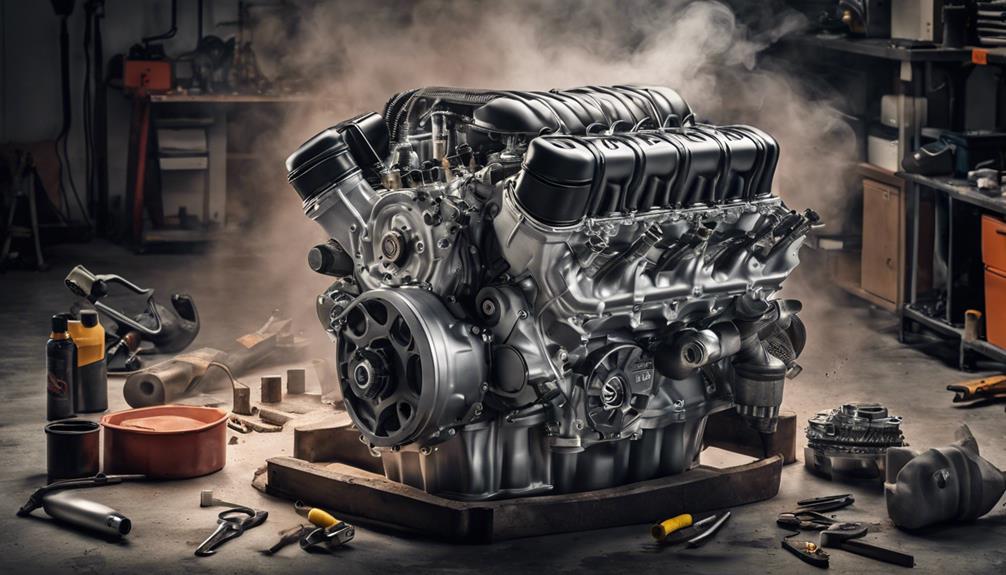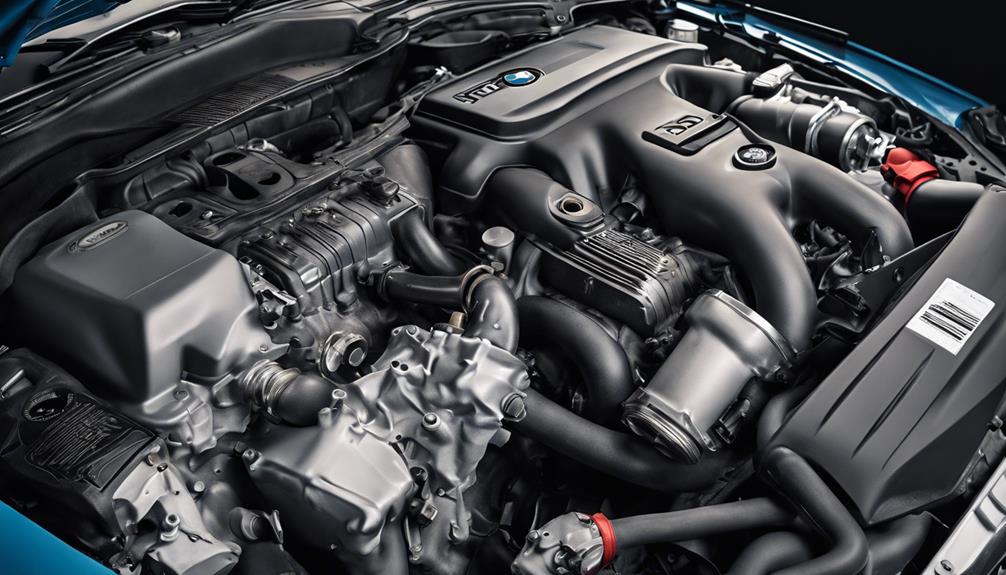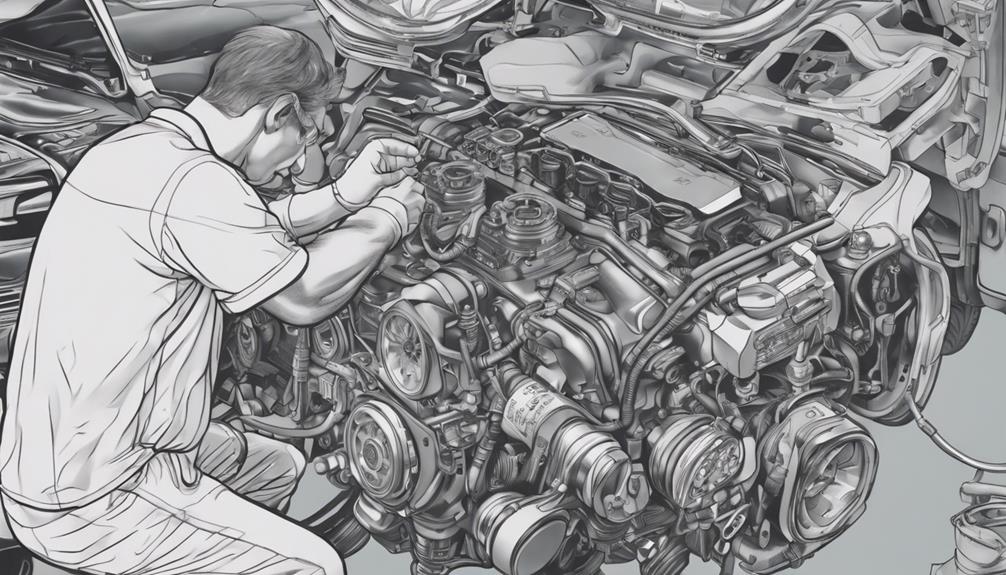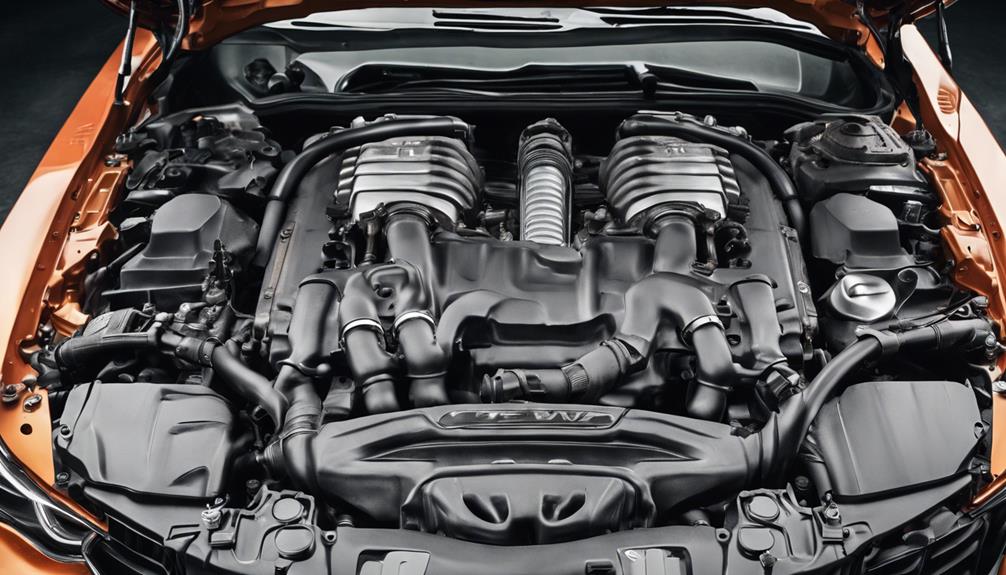Get ready for a rollercoaster of problems with your BMW M340i! From oil pump design quirks to excessive oil thirst, rear differential leaks, and engine hiccups, this high-performance beast will keep you on your toes. Watch out for plastic part mishaps, B58 TU engine woes, and the never-ending need for routine maintenance. The coolant system might throw a leak your way, while valve covers and gaskets demand your attention. But hey, if you want to know how to tackle these issues, buckle up because the ride gets even more exhilarating with each turn.
Key Takeaways
- Oil pump design concerns in 2020 models
- Excessive oil consumption with B58 TU engine
- Rear differential maintenance for drivetrain health
- Engine challenges like turbocharger issues
- Plastic component failures affecting performance
Oil Pump Design Concerns
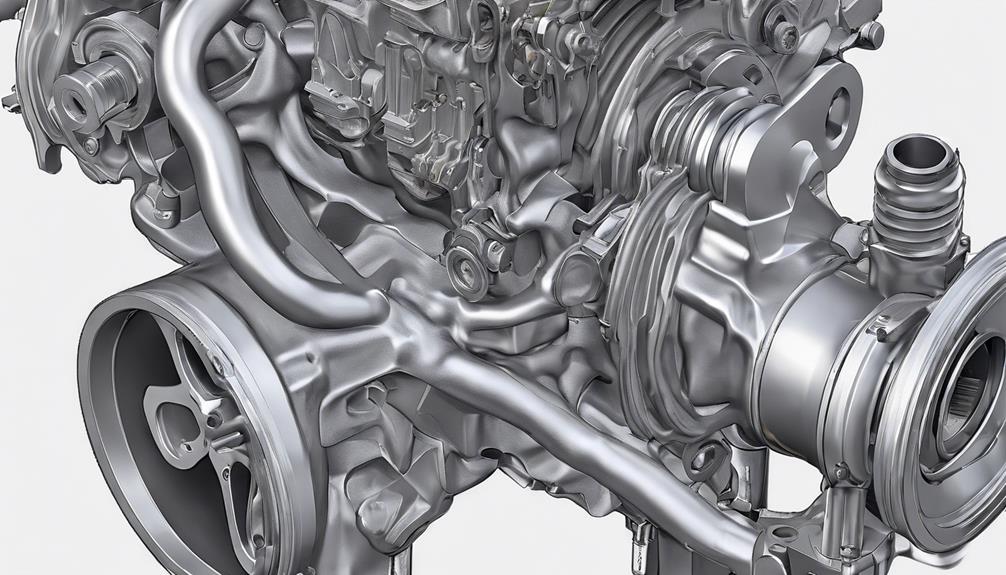
If you own a 2020 BMW M340i, be wary of potential oil pump design concerns that could lead to issues with oil pressure and consumption. The plastic components in the oil pumps of these models are more susceptible to failure compared to their metal counterparts in the newer 2021 versions. Keep an eye out for signs like abnormal oil pressure readings during measurements or under wide-open throttle situations. These indicators might point towards underlying problems with the oil pump.
Ensuring proper maintenance and regular checks on the oil pump can help prevent any major issues down the road. Remember, the oil pump plays an essential role in maintaining the right oil pressure for your engine to function at its best. Neglecting this component could result in decreased engine performance and potential damage due to inadequate lubrication.
Stay on top of your engine oil levels and monitor for any unusual consumption patterns to catch any problems early on. It's better to address these concerns promptly than to deal with more significant issues later.
Oil Consumption Issues
Excessive oil consumption in the BMW M340i can greatly impact engine performance and longevity, necessitating vigilant monitoring and timely interventions. The B58 TU engine, found in the M340i, is known to burn through a liter of oil every 1,500 miles, a quirk that can catch you off guard if you're not paying attention.
If you find yourself low on oil more frequently than expected, it might be time to schedule an oil change sooner rather than later to prevent any potential issues. Opting for thicker oil can help reduce oil consumption in turbocharged engines like the B58, although it's essential to strike a balance to maintain proper lubrication.
Keep an eye out for signs of oil pump problems, such as abnormal oil pressure readings, especially during wide-open throttle situations. Remember, monitoring and addressing oil consumption issues promptly are key to keeping your M340i running smoothly and efficiently.
Rear Differential Leaks

To safeguard your BMW M340i from potential drivetrain issues, keeping a watchful eye for rear differential leaks through regular maintenance is a wise move. Neglecting this crucial component can lead to lubrication problems and possible damage to your cherished vehicle.
Here are some key points to ponder:
- Regular Inspections: Schedule routine check-ups to detect any signs of leaks early on.
- Fluid Changes: Make sure timely changes of the rear differential fluid to maintain proper lubrication.
- Prompt Action: Address any leaks promptly to prevent further damage and maintain peak performance.
Monitoring for leaks in the rear differential isn't just about preventing a mess but also about preserving the core of your BMW M340i. By staying on top of maintenance tasks, you can enjoy a smooth driving experience without the concern of expensive repairs down the road.
Engine Maintenance Challenges
You're revving up your BMW M340i, but don't forget about the oil change frequency to keep that engine purring like a kitten.
Turbocharger issues might sneak up on you, so keeping a keen eye on your engine's performance is vital.
Cooling system concerns can turn your ride into a hot mess, so make sure to address any leaks promptly.
Oil Change Frequency
When it comes to maintaining your BMW M340i, staying on top of the recommended oil change frequency is essential for excellent engine performance and longevity. Here are some key points to keep in mind:
- The BMW M340i typically requires oil changes every 10,000 miles to keep the engine running smoothly.
- Using 0W20 oil in the B58 engine may lead to oil consumption, potentially burning a liter of oil every 1,500 miles in turbocharged engines like the M340i.
- Proper maintenance, including monitoring oil levels and addressing leaks promptly, is vital to prevent engine damage and maintain peak performance.
Keeping up with oil changes and addressing any oil consumption issues promptly will help your BMW M340i perform at its best and avoid costly repairs down the road.
Turbocharger Issues
Exploring the intricate world of BMW M340i engine maintenance reveals an essential focal point: Turbocharger Problems require careful attention. Turbocharger issues like turbo lag and boost leaks can disrupt engine performance, leading to power loss and unusual engine noises.
The high-performance demands placed on the BMW M340i engine make it susceptible to these challenges. To maintain peak performance, monitor boost levels regularly and use high-quality oil during maintenance. Ignoring signs of turbocharger problems, such as excessive smoke from the exhaust, can result in potential failures.
Addressing these issues promptly is critical to prevent further damage and ensure your BMW M340i operates at its finest. Remember, keeping a close eye on your turbocharger can enhance your driving experience.
Cooling System Concerns
To maintain peak performance in your BMW M340i, vigilantly monitoring the cooling system for leaks and proper functionality is essential.
- The cooling system in your BMW M340i may spring leaks in components like the radiator, water pump, or hoses.
- Engine overheating can result from cooling system malfunctions, potentially causing severe engine damage.
- Regularly checking coolant levels, inspecting for leaks, and ensuring the cooling system operates correctly are vital steps to prevent overheating issues.
Plastic Component Failures
You know those plastic components in your BMW M340i that seem innocent but can cause big headaches?
From brittle oil filter housings to fragile cooling system parts, these pieces can impact your car's performance and reliability.
Keep an eye out for any signs of wear and consider upgrading to more durable aftermarket alternatives to avoid future mishaps.
Common Plastic Part Failures
One notable vulnerability in the BMW M340i involves the susceptibility of certain plastic components to failure, a concern that owners should closely monitor for best performance and longevity. Here are some quick insights to keep in mind:
- Oil Pump Issues: Keep an eye out for abnormal oil pressure readings, especially under wide-open throttle conditions.
- 0W20 Oil Concerns: Using this oil may contribute to oil consumption, with turbocharged engines potentially burning a liter every 1,500 miles.
- Routine Maintenance: Regular check-ups and fluid changes in the rear differential can prevent leaks, essential for avoiding damage to the differential.
Stay ahead of these plastic part pitfalls with proactive care and monitoring to make sure your M340i remains in top shape!
Impact on Performance
The impact of plastic component failures on the performance of the BMW M340i is a critical concern that demands proactive monitoring and maintenance. The vulnerability of plastic parts in the 2020 models, compared to their metal counterparts in the 2021 versions, can lead to additional issues that affect your driving experience.
From oil pump malfunctions showing abnormal pressure readings to turbocharged engines like the B58 burning oil at a rate that could rival a thirsty camel crossing the desert, these problems can put a dent in your track time. Keep a keen eye out for rear differential leaks as they can sneak up on you, causing more trouble than a missed apex.
Stay sharp, stay ahead, and keep those leaks at bay to make sure the M340i performs as it should.
Solutions and Replacements
When addressing plastic component failures in the BMW M340i, identifying proactive solutions and suitable replacements is essential for maintaining peak performance and longevity of the vehicle. To tackle these issues in the long term, consider the following:
- Upgrade to Metal Components: Consider replacing plastic components in the oil pump with more durable metal ones to prevent failures.
- Regular Oil Pressure Checks: Monitor oil pressure regularly to catch any abnormalities that could signal oil pump issues.
- Scheduled Rear Differential Maintenance: Guarantee regular check-ups and fluid changes in the rear differential to prevent leaks and potential damage.
B58 TU Engine Problems
Experiencing oil pump design issues, the B58 TU engine in the BMW M340i 2020 models may encounter challenges due to plastic components. Signs of trouble can manifest as abnormal oil pressure readings during measurements and under wide-open throttle conditions. If you notice your turbocharged B58 TU engine using 0W20 oil burning about a liter every 1,500 miles, it might be time to investigate further. Exploring a table to highlight these issues:
| Common B58 TU Engine Problems | Symptoms | Solutions |
|---|---|---|
| Oil Pump Design Issues | Abnormal oil pressure readings | Check and replace pump |
| Oil Consumption | Burning 1 liter every 1,500 miles | Consider thicker oil |
| Lubrication Impact | Thicker oil viscosity | Monitor consumption |
Routine Maintenance Importance

To ensure your BMW M340i continues to perform at its best, prioritizing routine maintenance is essential. Neglecting this important aspect could lead to a world of trouble in the parking lot of automotive woes. Here are three vital reasons why staying on top of maintenance from the moment you take delivery of your M340i is a smart move:
- Oil Changes: Skipping oil changes is like expecting a plant to thrive without water – it's just not going to happen. Keep your engine lubricated and running smoothly by adhering to the scheduled oil change intervals.
- Fluid Checks: Ignoring fluid levels is a recipe for disaster. Make sure your coolant, brake fluid, and other essential fluids are at the right levels to avoid unexpected issues.
- Tire Rotations: Uneven tire wear can throw your whole car out of balance, and that's definitely not what you want. Get those tire rotations done regularly to keep things rolling smoothly.
Coolant System Leak Monitoring
Don't let your BMW M340i's coolant system leaks sneak up on you – vigilant monitoring is key to preventing costly engine troubles. Keeping an eye on your coolant system can save you from a world of hurt down the road. Regularly inspecting for leaks and addressing them promptly can help you avoid potential engine damage and expensive repairs. To help you stay on top of your coolant system health, here's a handy table to guide you on what to watch out for:
| Signs of Coolant System Issues | What to Do |
|---|---|
| Visible coolant leaks under the car | Get it checked by a mechanic |
| Low coolant level indicator on dashboard | Check for leaks and top up coolant |
| Engine overheating | Stop driving, let it cool, then check coolant levels |
| Sweet smell inside the car | Check for leaks and address promptly |
| Sludge or discoloration in the coolant | Flush and refill coolant system |
Valve Cover/Gasket Maintenance
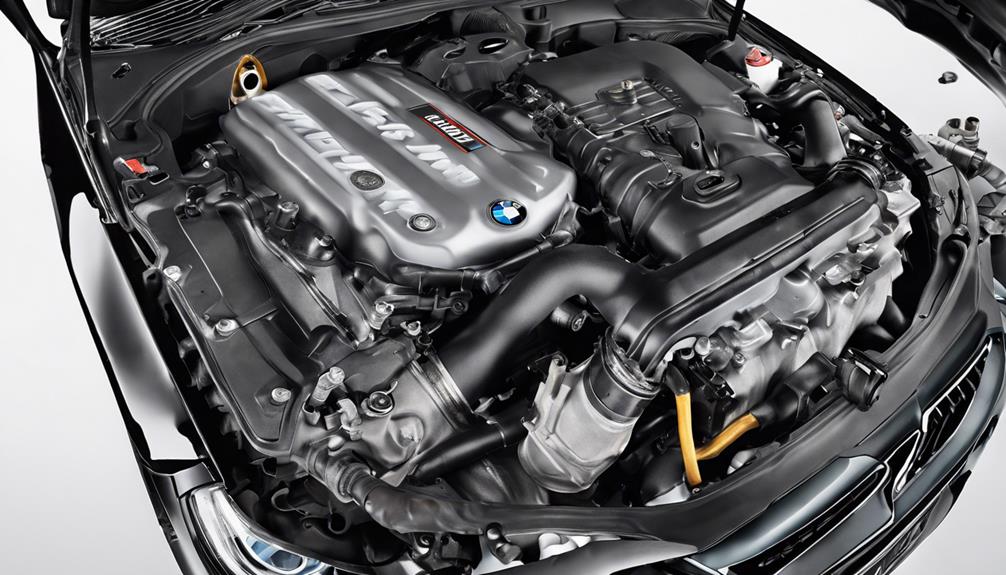
Regularly inspecting the valve cover for oil residue can help you detect potential gasket leaks early, ensuring peak engine performance and longevity. When it comes to maintaining your BMW M340i's valve cover and gaskets, staying proactive is key to preventing any oil-related mishaps.
Here are some essential tips to keep your engine running smoothly:
- Stay Vigilant: Keep an eye out for any oil residue around the valve cover. Early detection can save you from major headaches down the road.
- Act Promptly: Address any valve cover or gasket issues as soon as they arise. Procrastination can lead to oil loss and potential engine damage.
- Regular Checks: Make it a habit to monitor oil levels and inspect for leaks around the valve cover. It's a simple task that can reveal a lot about the health of your gaskets.
2020 Model Oil Pump Failures
With the 2020 BMW M340i models, be cautious of potential oil pump failures due to the plastic components used, which are more vulnerable to issues compared to the metal components in the 2021 models. Signs of oil pump problems can include abnormal oil pressure readings during measurement and under wide-open throttle. To highlight the differences between the oil pump components in the 2020 and 2021 BMW M340i models, consider the following table:
| Component | 2020 Models | 2021 Models |
|---|---|---|
| Material | Plastic | Metal |
| Durability | Prone to failure | More robust |
| Longevity | Less reliable | Higher reliability |
It's crucial to keep an eye out for these signs and consider preventive maintenance to avoid potential oil pump failures in your BMW M340i. Stay informed about your vehicle's components to guarantee a smooth driving experience without any unexpected breakdowns.
0W20 Oil Usage Impact

When using 0W20 oil in your BMW M340i with B58 TU engines, be mindful of potential oil consumption issues that may arise. Here are three important points to keep in mind:
- Turbocharged engines like the B58 may have a thirst for oil, burning approximately a liter every 1,500 miles. It's like your engine is saying, 'Slurp, I need more!'
- Thicker oil viscosity can impact lubrication, but it might just be the secret sauce to reducing oil consumption rates. Thicker oil, less drinking for your engine!
- Make sure to keep an eagle eye on your oil levels regularly. Monitoring them closely is key to managing oil consumption in your BMW M340i. Remember, a healthy engine is a happy engine!
Preventing Potential Damage
To safeguard your BMW M340i from potential damage, prioritize regular maintenance checks and immediate attention to any leaks or oil consumption issues. Regular maintenance, such as coolant system inspections, can prevent engine damage. Address rear differential leaks promptly through fluid changes to avoid harm to the differential system. Monitoring oil levels and addressing oil consumption problems can prevent engine damage and guarantee proper lubrication. Timely inspection and maintenance of valve covers and gaskets can prevent oil leaks and potential engine issues. DIY enthusiasts with the necessary tools and skills can save on repair costs by tackling sensor problems and other maintenance tasks themselves.
| Maintenance Tips for BMW M340i | Benefits |
|---|---|
| Regular Coolant System Inspections | Prevent Engine Damage |
| Immediately Address Differential Leaks | Avoid Differential System Damage |
| Monitor Oil Levels and Consumption | Prevent Engine Damage and Ensure Lubrication |
| Timely Valve Covers and Gaskets Maintenance | Prevent Oil Leaks and Engine Damage |
Frequently Asked Questions
How Reliable Are BMW M340i?
You can trust the BMW M340i for its reliable performance, proven by nearly a decade of solid engineering. It's a powerhouse that blends power with style, offering a thrilling driving experience that won't disappoint.
Do BMW M340i Depreciate a Lot?
Yes, BMW M340i does depreciate considerably due to factors like mileage, condition, and market demand. Opting for a used model helps offset the steep initial drop in value experienced by new ones, providing better value retention.
Is the M340 Worth It?
If you desire a blend of performance and luxury, the M340i is worth it. With its potent engine, driving dynamics, and strong resale value, you'll experience a thrilling ride that holds its value.
How Much Does It Cost to Maintain a BMW M340i?
Maintaining your BMW M340i costs an average of $968 annually, with around 0.9 trips to the repair shop per year. Despite potential expenses, BMW's reliability program covers services up to 36,000 miles, easing your ownership worries.
Conclusion
So, now you know the common problems with the BMW M340i.
Keep an eye on your oil pump, watch out for oil consumption issues, and check for rear differential leaks.
Don't forget about engine maintenance challenges and plastic component failures.
Stay on top of valve cover/gasket maintenance and be aware of 2020 model oil pump failures.
Remember, prevention is key to avoiding potential damage.
Drive safe and keep those BMWs running smoothly!






